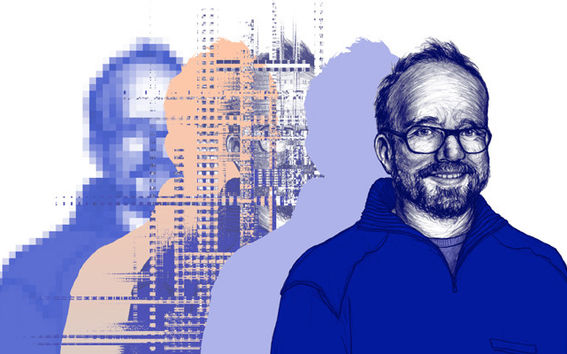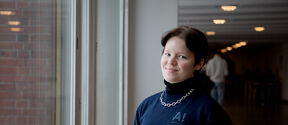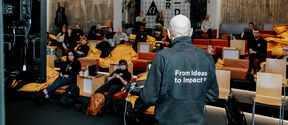Virtual reality is virtually here

At Aalto University, VR is being explored in numerous settings, and aficionados can be found in nearly everywhere. Researchers and students are keenly exploring, for example, virtual auditory environments, VR instruments, VR conference solutions, intelligent open data 3D maps, and 360° VR short films.
Professor of Film and Television Producing, Aleksi Bardy plans on bringing VR enthusiasts closer together at the new Aalto Studios – one of the University’s spearhead initiatives. Bardy is the Academic Head of the media centre, which was born in 2016.
“We have a sundry of VR ventures ongoing all around the University. Teaching, research, and artistic projects,” says Bardy. “As VR is not an established field, projects are currently quite scattered.”
Aalto Studios is in the midst of exciting times, with large-scale renewal ongoing in both its strategy and facilities. The centre has many ambitious aspirations, including an aim to support all of the various VR projects at Aalto, and also to bring VR project teams closer to each other.
Trial, error and discovery
Today, VR mostly refers to goggles or virtual reality phone cases that turn your phone into a VR headset, and you are more likely to run into VR at a science fair than at a movie theatre. Yet when it comes to virtual reality, there is no status quo. New ideas are emerging at record pace.
Aleksi Bardy estimates that consumer-friendly VR applications will probably be found very soon for games, infotainment, virtual travel and exploring different kinds of spaces.
“I believe that in these fields, VR holds a great deal of promise to be a genuine game changer. All of these examples have promising applications today,” Bardy points out.
Currently, the most advanced VR applications in existence are ones created for games, sales and product design. In industries like new construction, VR can allow prospective buyers to walk around a house before it is built; and in product design, VR prototyping can already save companies considerable time and resources.
Bardy predicts that in games especially, the sky is the limit: VR enables an immersive, interactive experience where outside stimuli are cut off. This may mean 360° vision, smells, the sensation of touching something virtually – probably all of these and more.
For Aalto University, VR entails a great deal of trial, error and discovery. After all, you cannot teach what is not yet known, but you can learn and create together.
“In emerging new fields or technological breakthroughs like VR, teaching is about teachers and students genuinely exploring and discovering new things together. Part of what we believe in today will be in the trash bin tomorrow – and this is a good thing,” Bardy states.
Sound, colour, 3D, VR
VR aficionados have high hopes in Bardy’s own area of expertise: film and television. VR promises to allow storytellers to fully immerse the viewer in the story’s world. Perhaps it won’t be long before we will all be able to virtually wander around the set of our favourite TV shows or stand right beside the protagonists in a blockbuster movie with a 360° view of the scene.
Although otherwise enthusiastic about VR’s many possibilities, when it comes to his own field of work, Bardy thinks that the winning concept has not been found yet.
“I believe that in the future, VR movies will offer us more immersive experiences than traditional movies, perhaps something between movies and theatre performances. This said, no matter where technology takes us, people will nonetheless also consume silent, black and white, or colour 2D movies as well,” Bardy emphasizes.
“VR is still at its early prototype phase in our field. What it will amount to in the film and television industry remains an open question. It is very likely that VR will establish a position in film and television as an effect – just like sound, colour or 3D,” Bardy assesses.
He reminds that interactive storytelling has been possible for a long time, but audiences have not wanted it.
“The storyteller’s dictatorship has driven narratives since the beginning of time, and cinematography is a direct descendant of the amphitheatre. No technology so far has ruptured this setting and I doubt VR will. Experiencing stories is based on surrendering yourself to a well plotted tale, it is regression!”
VR can shut out the world
A good example of recent activity at Bardy’s own academic home, the Department of Film, Television and Scenography, is the VR workshop arranged in August 2016 by Euphoria Borealis in cooperation with Tanja Bastamow, Synes Elischka and Victor Pardinho from Aalto.
The workshop offered participants a hands-on experience during which they developed, wrote, shot and edited 360° VR short films that were shown at a public screening as a part of the Love & Anarchy film festival in Helsinki.
“We are seeing a great deal of interesting experi-menting,” Bardy smiles. “As of now, the majority of our students are not active in VR. Then again, the ones who are – they are not asking questions, they are busy doing.”
“I estimate that in film and TV, the greatest way VR will change our lives is by offering us the possibility to expand a fully immersive experience outside the traditional movie theatre. VR will give us possibilities to completely shut out the outside world. Will this lead to isolation – or an opportunity for us all to take nice little breathers away from this chaotic world? Time will tell.”
Aalto Studios bring together media-related actors from inside and outside Aalto University. It enables advanced artistic and technical productions by offering production services and research in media; for example in virtual reality, television, games, acoustics, stage art – and combinations of these.
Professor Aleksi Bardy is a television writer, screenwriter and film producer, well-known for scripting movies such as Restless (2000) and Heart of a Lion (2013).
Bardy was appointed Professor of Practice, Film and TV Producing, in 2013. He is responsible for teaching film and television production as a major on the MA level.
Bardy leads a research team called Menestys (Success) and he is also the Academic Head of Aalto Studios, where he works together with Marcus Korhonen as the Operational Leader.
Alongside his academic work, Bardy remains active at the production company Helsinki-filmi, most often in the role of Executive Producer, but from time to time also as a scriptwriter. Helsinki-filmi’s largest endeavour at the moment is the Tom of Finland movie, which will premiere in February 2017.
This article is originally published in Aalto University Magazine 18 (issuu.com).
Read more news

Adaptive Reuse Seminar in Cambridge, UK
Two-day seminar in Cambridge on adaptive reuse of Downing Site, with student proposals, expert talks, and site visit.
Training available in AI, research data management, research ethics + more – register now!
New topics included! Registrations for spring 2026 are open.
Isabel Salmi emphasises that you don't have to be a math genius to study Information Technology
Third-year Information Technology student Isabel Salmi got help with developing a study technique – and found the joy of mathematics in the process






